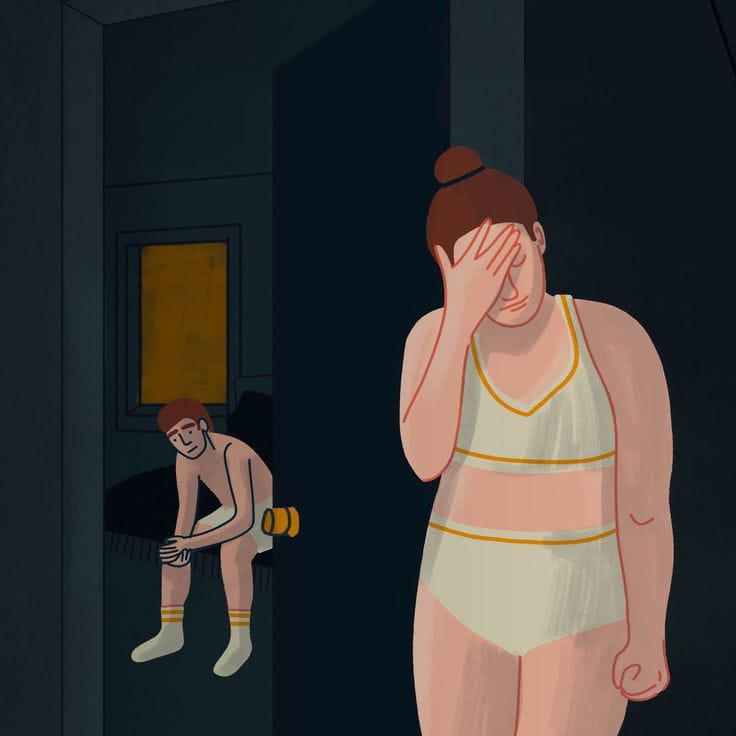While many women experience pleasure from sexual intercourse, a minority of women confront a different reality of painful penetration, for which they no control over.
Mark and Felicia, a Nigerian couple, had been married for 8 years without sex. The act of penetration often brought Felicia so much pain and discomfort that she lost interest in sexual intercourse. Felicia soon came to discover that she suffered from a medical condition known as vaginismus. Characterised by involuntary muscle spasms in the vagina, the condition causes a burning sensation around the vagina.
Weary with concern, Felicia went on a relentless search for help across many different places as her condition worsened. When her husband abandoned her for another woman, Felicia’s grief knew no bounds.
The story of Mark and Felicia is the subject of a recent Facebook post that hoped to raise awareness about vaginismus and help couples deal with the turmoil associated with the disease.
What is Vaginismus
Vaginismus is the involuntary contraction of muscles around the vagina. These unintentional muscle spasms occur when a penis, a finger or even a tampon attempts to penetrate the vagina. The sudden twitches in the vaginal muscles may be mildly uncomfortable or excruciatingly painful.
“Spasms make the vagina very narrow and can prevent sexual activity and medical exams. It is one possible cause of painful intercourse, also known as dyspareunia,” explains Ivana MD, an obstetrician and gynaecologist, in a video she posted on Facebook.
The disease is marked by painful penetration or a burning sensation around the vagina, which invariably instills a sense of fear in its victims.
Yet vaginismus is just as common worldwide. According to a 2019 study, about 57% of female patients who visited the Sexual Medicine and Therapy clinic at Monash Health, in Australia, sought treatment for painful intercourse. Of these patients, 60% were diagnosed with vaginismus, many of whom had suffered symptoms for more than five years. The study also indicated that roughly one in 5 of the women had endured the condition for a decade or longer.
Like Felicia, Tito Oladapo was gripped by pain from dealing with vaginismus. As a devout Christian, Oladapo wouldn’t engage in sex with her husband until they were officially married. who is now creating awareness about it in religious gatherings and the media.
“However, as much as I never had any preconceived ideas of what my wedding would look like, I knew what it wasn’t going to look like. And for the life of me, it was not that my husband and I would have a major issue with consummating our marriage properly for months,” says Oladapo,
Weeks into her marriage, Oladapo continued to dread penetrative sex and the throbbing pain that came with it. As she described, this made for an unpleasant honeymoon.
Causes of Vaginismus
Vaginismus is reported to manifest in various ways, often to varying degrees. Fear and anxiety, particularly surrounding pain, pregnancy, or sexually transmitted infections, are common factors that contribute to the development of primary vaginismus.
Also, cultural or religious taboos regarding sex, as well as internal conflict regarding sexual expression, can exacerbate these anxieties. Additionally, engaging in sexual activity without genuine arousal or desire can further intensify feelings of discomfort and anxiety, igniting the cycle of vaginismus.
More often than not, secondary vaginismus may arise due to similar psychological and emotional factors, compounded by painful intercourse. Oladapo would ultimately discover that her condition was the result of a sexual abuse in her childhood.
A lack of libido or arousal can contribute to the development of secondary vaginismus, as can infections or skin conditions such as vaginal infections or dermatological problems. Moreover, gynaecological issues like endometriosis or pelvic surgery can also trigger vaginismus, complicating the condition further and exacerbating feelings of distress and discomfort.
Vaginismus can profoundly impact an individual’s emotional and physical well-being, necessitating sensitive and comprehensive support and intervention.
The Way Out
“The main goal of vaginismus treatment is to manage the mental and physical factors that prevent comfortable vaginal penetration from occurring,” suggests Ivana, the obsetrician and gynaecologist.
A multidisciplinary approach to managing vaginismus has emerged as the most effective strategy, encompassing various aspects of education, medical intervention, and psychological support.
Central to this approach is comprehensive education about vaginismus itself, as well as understanding the pelvic floor and sexual anatomy. Providing couples with accurate information empowers them to better comprehend their condition and navigate potential treatment options.
Additionally, psychological support plays a crucial role in addressing the emotional and mental aspects of vaginismus, helping individuals manage underlying worries and anxieties related to their condition. Therapeutic interventions aim to provide individuals with coping strategies and emotional support as they navigate the challenges associated with vaginismus.
Oladapo soon found a solution in a video she saw on Netflix. “Then came a program called “Sex, Love and Goop” on Netflix. There were many things I did not agree with in that documentary, but our breakthrough came through a procedure on the show Calculated Breathing,” said Oladapo, who now raises awareness about vaginismus in her church and on social media.
With repeated bursts of breath before sex, Oladapo could get her body to relax and bask in the foreplay. She also began a practice of positive thinking. “This is good for me. This is good for us. He is one of us now.”
Not an easy ride at first, but these mental exercises have ushered in a stream of bliss that was markedly absent in her first year of marriage.
PS: names have been changed to protect their identity
While many women experience pleasure from sexual intercourse, a minority confront painful penetration due to a condition called vaginismus. Mark and Felicia, a Nigerian couple, faced this issue in their marriage, leading to Felicia's discovery of her condition. Vaginismus is characterized by involuntary muscle spasms in the vagina, causing discomfort or pain during penetration, which impacts sexual activity and medical exams.
Studies, such as one from Monash Health in Australia, indicate that vaginismus affects a significant number of women worldwide. Factors contributing to vaginismus include fear, anxiety, cultural or religious taboos, lack of arousal, infections, and past trauma like sexual abuse. Treatment focuses on managing both mental and physical aspects through education, psychological support, and sometimes medical intervention.
Oladapo, another woman with vaginismus, found relief from a technique called Calculated Breathing featured in a Netflix program. She now engages in mental exercises and spreads awareness about the condition. Comprehensive support and intervention are crucial for those affected by vaginismus to improve their quality of life.






